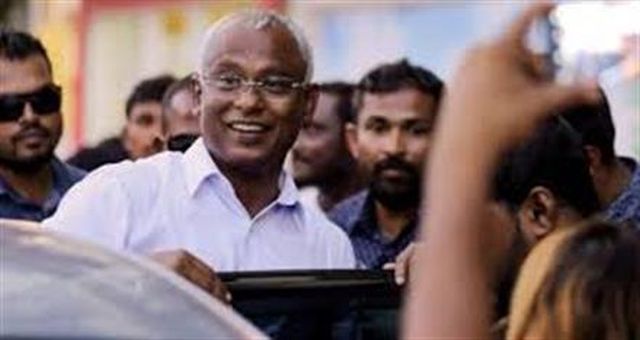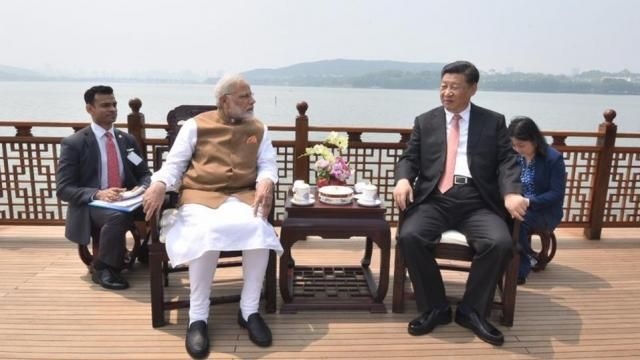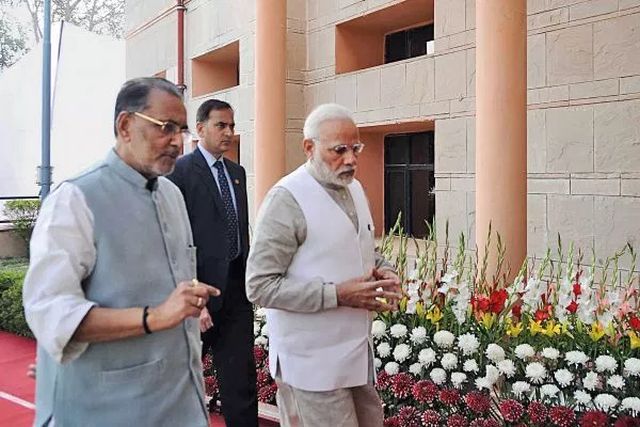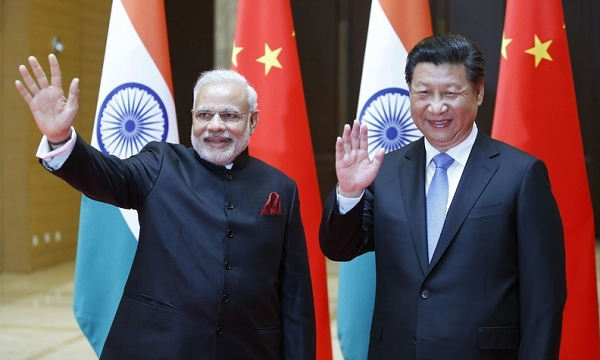
by admin | May 25, 2021 | Muslim World

Former Maldives President Abdulla Yameen
New Delhi : Former Maldives President Abdulla Yameen tried to play India and China against each other, but the new government of Ibrahim Mohamed Solih has a strong “India-first policy” and was not interested in playing such games, the country’s Foreign Minister Abdulla Shahid said on Tuesday.
He siad even as India was the closest and most-trusted friend of the Maldives, the new government in the island nation was open to engaging with other countries, including China.
“President Yameen, during his five years in office, tried to play China against India, and India against China. He thought he could become a puppet-master. He thought the greatest two countries in Asia could be his puppets. He failed miserably,” Shahid said during a press conference in Delhi.
“Our government will not try to play one country against the other. We have a strong India-first policy, but we will also get engaged with all countries and we will be ready to do business with them,” he said.
“Our message is very clear: India is our closest and most trusted friend and neighbour. We are committed to re-igniting the India-Maldives friendship and relationship, reaching new horizons, exploring new avenues while strengthening existing links,” he said.
Shahid, along with Maldives’ Finance Minister Ibrahim Ameer and Economic Development Minister Fayyaz Ismail, was on a two-day visit to India to discuss a range of issues including economic, social and defence cooperation. The new government took reigns of the island country last week.
Shahid said the Maldives was immediately looking for India to help them on the budgetary constraints that they were facing.
“We have received very positive feedback from India… India has given us an assurance they will help us sustain and stabilise the budget. The modalities of the same are being worked out.
“We are also looking at India to lead in engaging with us on projects related to diversification of our economy. We want to vigorously engage with Indian business community on development of Indian economy,” he said.
During the visit, the Maldives recommitted itself to the 1979 visa agreement, with a plan to reviewing it in due course. It also assured India that stalled projects between the two countries would move forward.
“We also reaffirm our commitment to the peace and security of the Indian Ocean and our neighbourhood. We are committed to keeping the Indian Ocean safe and secure, and to working with India to combat terrorism in all its forms,” Shahid said.
On the Maldives looking into deals made with China, Shahid said while many of those deals were made in secrecy and were being reviewed, the island country continued to see China as a friend.
“The Free Trade Agreement (with China) was rushed through parliament… As foreign minister, I have asked my officials to review the document. We will publicly comment on it after the review is complete.”
“China has been generous to us. They have assisted us in a lot of projects, and the country has benefitted over the last 50 years through the generosity of China. It is one of the largest economies in the world and we cannot shy away from that reality. We will continue to engage ourselves with China. China is a friend,” he said.
The minister said the delegation’s visit would be followed by President Ibrahim Mohamed Solih’s visit to India on December 17, “with hope that such high-level exchanges would continue between the two countries”.
—IANS

by admin | May 25, 2021 | Business Summit, Corporate, Corporate Governance, Economy, Events, News, Politics, Social Round-up
 By Gaurav Sharma,
By Gaurav Sharma,
Wuhan (China) : India and China on Saturday agreed on a joint economic project in Afghanistan, sources said after a two-day summit between Prime Minister Narendra Modi and Chinese President Xi Jinping here.
The long-standing border issue also figured in the meeting where Modi and Xi decided to give “strategic guidance” to their armies to prevent a Doklam-like military stand-off in 2017.
“The two leaders endorsed the work of the Special Representatives in their efforts to find a fair, reliable and truly acceptable settlement. They also underscored that in the meantime it is important to maintain peace and tranquility in all areas of the India-China border region,” India’s Foreign Secretary Vijay Gokhale said here.
“And to this end, the two leaders decided that they would issue strategic guidance to their respective militaries to strengthen communication and to build trust and understanding to implement the various confidence-building measures which have already been agreed upon the two sides and to strengthen existing institutional mechanism to prevent and manage situations in the border areas,” he added.
Earlier on Saturday, Modi and Xi walked by the East Lake as they began their second round of talks.
On Friday, the two leaders agreed that healthy bilateral ties were important for a better world as they met to re-set the ties between the two nations hit by the military face-off.
—IANS

by admin | May 25, 2021 | Corporate, Corporate Governance, News, Politics
 By Gaurav Sharma,
By Gaurav Sharma,
Wuhan (China) : Prime Minister Narendra Modi and President Xi Jinping agreed that healthy bilateral ties were important for a better world as the two met in the Chinese city Wuhan to re-set the ties between India and China hit by last year’s military face-off.
On the opening day of the two-day summit, when the Chinese rolled out the red carpet for Modi, both the leaders said they would want more such informal meetings. Modi invited Xi to India in 2019.
Modi and Xi, who will have more substantive talks on Saturday, said healthy Sino-Indian ties were imperative to maintain peace and stability in the world.
India and China share a tense relationship owing to their 1962 war. Their ties touched a new low last year when their militaries were locked in a face-off near their disputed boundary.
While they had a half hour one-on-one meet at the Hubei Provincial Museum, the planned 30-minute delegation level meeting stretched to two hours.
“Our two countries have established a closed partnership. Our exchanges and cooperation have made positive progress. China and India have a combined population of 2.6 billion which has an enormous potential,” Xi said.
“As we meet, international security is at a crucial period of adjustment. China and India are both important engines for global growth and we are central pillars for promoting a multi-polar and globalised world.
“A good China-India relation is an important and positive factor for peace and stability in the world.
“I believe in the future, we will meet in a format like this from time to time. I look forward to in-depth communication with your Excellency,” Xi added.
Modi sounded equally positive.
“I agree with your message for peace and stability in the world. India and China can play a big positive role for world peace and stability.”
“During the five-yearly Congress last year, you talked about the new era (of China). In India, I am talking about new India. This reflects our similar mindset. Your dream of China’s new era and our attempt for a new India will benefit the world.
“I think the closeness and mutual trust we have established will gradually give way for people-to-people contact and will be good for the bright future.
“I am grateful for your invite and the welcome extended by you. This is perhaps the first time you have received an Indian Prime Minister twice away from Beijing,” Modi said. “This is a matter of pride for India as you yourself came to Wuhan to welcome me.
“This is just not an informal summit of two leaders but it has a historical context too.”
Modi was earlier welcomed at the Hubei Provincial Museum with an impressive cultural performance. Xi and Modi shook hands for 30 seconds. Both leaders then took a tour of the site for around an hour.
“India and China cultural connect goes back many centuries and is reflected in present times through the popularity of Bollywood, yoga and other aspects of Indian culture,” Indian External Affairs Ministry spokesperson Raveesh Kumar quoted Modi as saying.
“In the history of 2,000 years, the economies of India and China were the anchors of the world economy for 1,600 years. In these 1,600 years, Indian and Chinese economies together accounted for 50 percent of the world’s economy.”
Xi took Modi on a tour of the exhibition of Marquis Yi of Zeng Cultural Relics and Treasure at the museum.
Modi presented Xi reprints of two paintings done by the celebrated Chinese painter Xu Beihong (1895-1953) during his stay in Shanti Niketan in 1939-40. Xu came to Shanti Niketan as the first visiting professor from China.
Modi and Xi saw an exhibition of fine relics from the Chinese civilization.
They also exchanged views on the relationship and communications between the ancient civilizations of China and India.
On Saturday, Modi and Xi will walk by the East Lake, have a boat ride and hold discussions at the East Lake guesthouse.
(Gaurav Sharma can be contacted at sharmagaurav71@gmail.com)
—IANS

by admin | May 25, 2021 | Business, Corporate, Corporate Reports, Emerging Businesses, Finance, Investing, Medium Enterprise, News, Politics
 New Delhi : Asian enterprises, especially those in India and China, are fast adopting Artificial Intelligence (AI) to reinvent their business models and perceive AI as a complete disruptive force, a new Forrester research said on Wednesday.
New Delhi : Asian enterprises, especially those in India and China, are fast adopting Artificial Intelligence (AI) to reinvent their business models and perceive AI as a complete disruptive force, a new Forrester research said on Wednesday.
Led by China (from 31 per cent to 61 per cent) and India (from 29 per cent to 69 per cent), the investment and adoption in Asia has jumped significantly between 2016 and 2017.
“Indian systems integrators are also actively participating in AI consortiums such as OpenAI,” the research added.
Government-backed AI is fuelling innovation in existing tech firms, startups and academic communities.
On February 18, Prime Minister Narendra Modi said that with AI, bots and robots, productivity will increase, urging that AI should be “Made in India” and “Made to Work for India”.
In his budget speech on February 1, Finance Minister Arun Jaitley said the government think-tank Niti Aayog will spearhead a national programme on AI, including research and development.
“Japan, Singapore and South Korea are following closely by expanding their existing technology industry strength in robotics electronics to compete against companies like Intel and NVIDIA,” said the research.
What stands out among Asian enterprises, noted the report, is the heavy focus on strategic, longer-term objectives and high outcomes compared with other regions and global enterprises.
“These firms prioritise industry disruption and new product development higher than other regions and global enterprises,” Forrester said.
Internal investments are driven by the marketing, sales, and customer support areas that are developing cognitive products and engaging with customers through intelligent agents.
Asian enterprises see AI as a complete disruptive force across technology, industry, product, go-to-market, academic, and economic dimensions.
The Chinese growth in the field of AI research has threatened US tech companies.
“Rather than develop incremental technologies, companies like Alibaba, Baidu and Tencent are as active in self-driving car tech as Google is in the US, even to the point of pushing the boundaries of Chinese regulations while still testing their technology,” the research emphasised.
Universities are research resources for companies like Huawei, which recently invested $1 million with UC Berkley for research and development in AI.
The South Korean government announced $1 billion in AI funding in 2017 while Japanese PM Shinzo Abe has encouraged AI startups and venture capital infusion.
The national research foundation of Singapore’s government announced a national AI plan, “AI.SG”, to boost the country’s AI capabilities.
—IANS

by admin | May 25, 2021 | News, Politics
 By Gaurav Sharma,
By Gaurav Sharma,
Beijing : China on Monday expressed anger over Indian Army chief Bipin Rawat’s recent remarks, saying such “unconstructive” comments defy the consensus to maintain peace and would rather hurt it.
At a press conference last week, Gen Rawat said it was time India shifted its focus from the western border with Pakistan to its northern frontier with China, which could send back troops again to the point of face-off in Doklam plateau.
He also said that India needed to check China’s growing assertiveness in the neighbouring countries in the South Asia region.
Chinese Foreign Ministry spokesperson Lu Kang said the remarks would disturb peace, which both countries were trying to restore after a military stand-off last year.
“Last year, India-China relations have witnessed some twists and turns but Chinese President Xi Jinping and Prime Minister Narendra Modi during their meeting on the sidelines of the BRICS meeting last September reached a consensus to bring the ties back on track,” Lu said.
“Recently, the two sides enhanced dialogue on consultations and bilateral relations have shown sound momentum of improvement and development.
“Under such background, the unconstructive remarks by the Indian senior officials not only go against the consensus reached by the two heads of state and do not conform to the efforts made by the two sides to improve and develop bilateral relations.
“It cannot help to preserve tranquillity and peace in the border areas,” Lu added.
Lu said India should stick to the consensus reached between Modi and Xi and “refrain from doing things which may complicate the situation. This serves the common interest of the whole region and the interest of the Indian side.”
Briefing the media, Gen Rawat had said the Chinese troops retreated from Doka La in Doklam possibly due to the harsh winter and could return to the point of the face-off.
Indian and Chinese troops were locked in an over two-month stand-off at Doka La in Doklam plateau over road construction by China.
The borders of India, China and Bhutan meet at Doka La in Doklam, which is claimed by Beijing and Thimpu.
India’s objection to the road was Doka La’s proximity to its highway that connects its northeast with rest of the country. Both armies retreated from the point of face-off on August 28.
Asked which particular remark of Gen Rawat’s China has taken exception to, Lu said: “I have made myself clear. If the senior official according to the report referred to Donglang (Doklam), I think you are clear about our position – Donglang belongs to China and has always been in the effective jurisdiction of China.
“The China border troops patrolling and stationed in the area are exercising our sovereignty rights. We hope the Indian side has learned the lessons of history and will avoid similar accidents to take place again.
“If he refers to the situation in the whole India-China boundary, I have also said that last September the two heads of state have reached important consensus during the Xiamen summit. Both sides have maintained effective communication since then.
“The aim is to enhance strategic mutual trust and create enabling atmosphere for strategic communication. Recently the bilateral relations have shown positive momentum.
“On such background, the official mentioned by you made such kind of remarks that go against the consensus of the states and do not conform to the general trend of improvement of bilateral relations. We believe such kinds of remarks are not conducive to maintaining peace and tranquility in border areas.”
—IANS





